69. Politics
byPolitics became an increasingly important aspect of Elon Musk’s life and career between 2020 and 2022, especially as he became more vocal about his discontent with government mandates and progressive political ideologies. One of the most defining moments of this period was his reaction to the COVID-19 pandemic and the associated government restrictions. When California’s stay-at-home order forced businesses to shut down, Musk refused to close Tesla’s Fremont factory, arguing that it was unnecessary and harmful to the economy. His defiance against local authorities, which threatened legal action, was emblematic of his broader anti-authoritarian stance, signaling a growing resistance to government control that would shape his political views in the years to come. This period of tension marked the beginning of Musk’s more vocal criticisms of governmental authority and his increasing willingness to challenge the status quo.
As Musk’s political views began to evolve, they were also influenced by his frustrations with the rise of progressive social movements. He frequently expressed his opposition to what he called the “woke-mind virus,” a term he used to describe the culture of political correctness and the growing influence of social justice activism, which he believed was undermining merit and rational discourse. Musk’s views were also shaped by personal experiences, particularly with his family. His daughter’s transition and the broader cultural shifts he witnessed made him feel alienated from progressive ideologies, leading him to increasingly criticize the left-wing policies and positions he had once supported. Musk’s evolving political stance marked a significant departure from his previous alignment with liberal figures such as Barack Obama. As his disillusionment with the progressive agenda deepened, Musk began to openly support moderate and even Republican candidates, signaling his shift toward more conservative ideologies.
The political pivot Musk experienced also intersected with his increasing prominence as a billionaire entrepreneur. The public scrutiny he faced over various controversies, such as his outspoken criticism of the Democratic establishment and the challenges in managing his businesses, furthered his frustration with the political climate. One notable moment that fueled this frustration was his exclusion from a White House event recognizing electric vehicles, despite Tesla’s major contributions to the electric vehicle industry. Musk saw this as a clear instance of partisan bias and believed it exemplified the growing rift between his work and the political elite. This event reinforced his belief that the Democratic Party was antagonistic toward him and his businesses, pushing him closer to the libertarian and conservative circles he had been increasingly aligned with in recent years.
Musk’s shifting political views were also influenced by his relationships with certain figures in the media and the tech industry. He frequently engaged with controversial personalities such as Joe Rogan and Jordan Peterson, both of whom have been known for their anti-woke rhetoric and criticisms of political correctness. These interactions provided Musk with a platform to voice his beliefs and expand his influence within right-leaning circles. His friendships with individuals from his PayPal days, many of whom also leaned toward libertarian or right-wing ideologies, further shaped his evolving political identity. Musk’s exposure to these figures, coupled with his growing disillusionment with the left, contributed to his overall skepticism toward government intervention and his belief in the importance of a free-market, decentralized approach to technology and business.
Musk’s personal interests also played a significant role in his political transformation. His love for video games, for instance, gave him a unique perspective on strategy and competition, which he often related to his business acumen and decision-making process. Video games, which Musk has often described as a form of escape, allowed him to think critically and analytically about challenges in both his personal life and business ventures. His passion for gaming, with its focus on strategy, planning, and problem-solving, influenced how he approached his political and ideological confrontations, allowing him to develop a mindset that prized individual freedom and autonomy over government regulation. This mindset, forged through both personal experiences and professional challenges, shaped how Musk navigated the increasingly complex political landscape surrounding his public persona and business ventures.
Ultimately, Musk’s political evolution from a tech entrepreneur with liberal leanings to a more vocal critic of progressive ideologies illustrates the complex interplay between personal values, business interests, and public life. His growing distaste for government intervention, particularly in the tech industry, positioned him as an increasingly influential figure in political debates, especially around issues like free speech, regulation, and corporate power. Musk’s frequent statements on political issues highlighted the increasing polarization of American politics and his own attempts to carve out a position that aligned more closely with his business goals and personal beliefs. As he became more engaged in political discourse, Musk also made headlines with his controversial public remarks and his outspoken criticisms of both political parties. This period marked a significant chapter in Musk’s life, as his ideological shift had far-reaching implications not only for his companies but also for the broader cultural and political landscape. His personal journey toward a more libertarian, conservative stance showed how personal experiences and professional challenges can intertwine to shape a public figure’s political identity in unpredictable ways.


